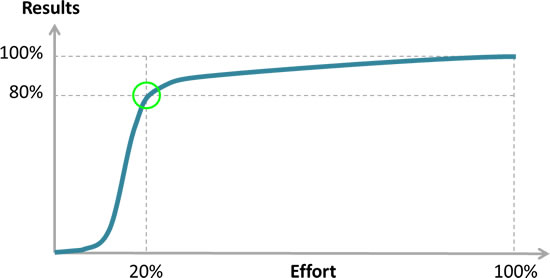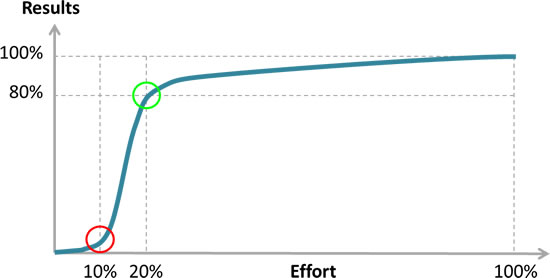Internet Marketing Strategies that Leave Time for the Rest of Your Business
Employing effective internet marketing strategies is like battling the mythical many-headed serpent, the Hydra. Every time you lop off one of its heads, two grow back to replace it. Unless you’re Hercules, that’s just no fun at all.

You could spend 100 hours a week marketing your small business and never “finish”. There’s always more you could do, always new potential avenues appearing as you dig deeper. How do you manage this beast and get back to the rest of your business?
Internet marketing strategies that make sense
There is a smarter approach that won’t sap all your time (and money). And you find it by following the 80/20 Rule, aka the “Pareto Principle“:
80% of the results can be achieved with 20% of the effort.
For small business owners, this should be the Golden Rule. And the corollary should be enough to instill terror in your heart:
The remaining 20% of results require 4x the effort!

So, assuming that you want to use your time and money wisely, how can you best apply the 80/20 Rule to Internet Marketing?
1) Focus on one marketing program at a time
Pop quiz: If you can get 80% of return from 20% of effort, does that mean you can get maybe 60% of return from just 10% of effort? (And, therefore, should you do just a tiny bit of work on a whole bunch of marketing programs for the best results?)
Nope. The Pareto curve for results vs. effort is an S-curve. The long tail at the end represents diminishing returns, and the short curve at the beginning represents initial setup and learning.

For example, an “80% results” FaceBook campaign to build fans might involve configuring a new FaceBook page for your small business, adding enticing info and images, adding some seed posts, and setting up a contest with exciting giveaways (10% effort), and only then inviting everyone you know to your new page and engaging in conversations on your wall (20% effort).
The initial 10% of work didn’t bring you a single new fan, while the next 10% brought you oodles!
And the problem for many of us is that we end up doing 5-10% effort on a half dozen different internet marketing programs instead of prioritizing the best one to tackle first and giving it the 20% effort needed to see significant results.
Zero results from six programs will always be less than 80% results from one!
BOTTOM LINE: To see the most results the fastest, pick your single highest priority marketing program and put in the 20% effort to nail it. Then move on to the next program and do the same.
BONUS: Did the FaceBook contest idea sound interesting? Here is Social Media Examiner’s take on how to run successful FaceBook contests and how to make your FaceBook contest stand out. And consider using affordable expert help to create your FaceBook contest.
2) Find one tool that’s “good enough” for the need
The wonderful thing about the internet is the seemingly unending supply of tools, guides and advice. And the terrible thing about the internet is the seemingly unending supply of tools, guides and advice. How do you make use of it all? Well, you can’t. And you’ll injure yourself trying.
Take keyword research for SEO optimization as an example. There are dozens of professional tools you can use if you decide to do this yourself.
- Some are one-time purchases while others have monthly fees.
- Some run on your PC while others run in the cloud.
- Some focus on organic keywords while others specialize for Adwords.
You could spend a week just researching these SEO tools. (I know. I have.)
But you can get 80% of the results in 20% of the time (and for FREE) simply by using Google’s Keyword Tool and just a few columns of its data.

Given all of your other urgent business priorities, why do more?
In this blog post I cover how to perform this 80/20 keyword research, which is a critical first step for your small business marketing strategy.
BOTTOM LINE: Find one internet marketing tool that’s “good enough” for a particular project and master it. You’ll get faster results than from analyzing and testing dozens of tools, and you’ll get better results than from using several tools “kinda well”.
BONUS: If you’re ready to go a bit beyond Google’s Keyword Tool, my next recommendation is to download a free trial of Market Samurai’s keyword tool. It has a steeper learning curve, and it uses a different search database so you still need to correlate the results to Google. But it will broaden the scope of your keyword research, make it easier to filter down to the best finalists, and provide very valuable additional competitive info. Plus they have some of the best how-to videos (complete with transcripts) that you’ll ever find.
3) Start and stop working before it’s “perfect”
For a busy small business owner perfectionism is an illness (one that I’ve been personally afflicted with my whole life).
Perfectionism slows you down and drains your energy away from more fruitful labors.
Blogging seems to be perfectionism’s favorite target.
Why don’t you start blogging for your small business?
- “I haven’t found the perfect topic yet.”
- “I haven’t completed all the research yet.”
- “I haven’t had it reviewed by enough people yet.”
- “I haven’t rewritten it enough times yet.”
Why did you stop blogging?
- “I ran out of perfect topic ideas.”
- “It took too long to keep writing perfect posts.”
The problem is obvious:
“If we wait for the moment when everything, absolutely everything is ready, we shall never begin.” (Ivan Turgenev)
Following the 80/20 rule for blogging means:
- Start writing when an idea moves you. You can worry about crafting it into a complete, well-structured blog post later (or possibly never!).
- Limit your iterations. Feel free to do a little research to check your ideas and get feedback. But recognize that, here too, the first 20% of research/feedback will yield 80% of the results, so don’t wait for the rest.
- Publish before it’s perfect. Remember, it’s okay to go back and edit blog posts later if you find you really need to. But most likely you won’t, and that’s okay!
BOTTOM LINE: The path to success for today’s small business owner is to move forward as quickly as possible. Perfectionism straps a load of bricks onto your back. Remind yourself that it’s not worth it right now to spend 4x more time to achieve the last 20% of results from a particular internet marketing effort, and keep moving forward!
BONUS: If you’re itching to start blogging, here is a diverse and valuable collection of ProBlogger’s most helpful blogging guides.
4) Recognize when you can save by spending
You know there are many parts of your business where you come out ahead by paying someone else to do specialty work.
- You pay an expert to do your taxes.
- You pay an expert to write your legal contracts.
- You pay an expert to balance your books.
Similarly, it will often make sense to pay an expert to plan and execute some or all of your internet marketing strategies.
Sure, you could spend several months learning how to use, interpret and optimize Google Adwords through your own diligent study, research and trial and error. And in the process you’d “save” the several thousands of dollars you might pay an expert to run an optimal campaign for you.
But did you really save money?
To answer that, decide how you value your time. Do you consider one hour of your time spent on your business to be worth, say $100? Then if you spent 100 hours mastering Adwords over a span of 3 months, that effort had an opportunity cost to you of $10,000!
“The best executive is the one who has sense enough to pick good men to do what he wants done, and self-restraint enough to keep from meddling with them while they do it.” (Theodore Roosevelt)
Depending on the size of your campaign you might have paid an expert anywhere from $1,000 to $3,000 for the same work, and they would have achieved better results more quickly.
Plus you would have developed a new relationship that could continue to multiply your returns for months or years to come. And you would have off-loaded your to-do list.
So in this case, you can get >100% of the results that you would achieve yourself by investing 20% of the time and money in an internet marketing expert instead of trying to be a jack-of-all-trades yourself.
BOTTOM LINE: As a small business owner you win when you spend your time doing what you’re good at. Learn to effectively delegate everything else.
BONUS: If you determine that your time is well spent by running your own Google Adwords campaign, you’ll need some help. You can use Google’s Adwords Learning Center (even if you don’t take the certification tests), and you should consider using the very insightful WordStream Adwords Performance Grader for a free report of how you’re doing.
Conclusion
Following the 80/20 rule can help small business owners like you employ effective internet marketing strategies without neglecting the rest of your business.
Focus on one internet marketing program at a time, use one effective tool, and move ahead before everything is perfect. And if you can save (or earn) more money in the long run by instead hiring an expert – do it!
Why was Hercules able to slay the Hydra when all others had failed? Because he was the right guy for the job, he didn’t worry about making perfect cuts, he used an effective sword, and he focused on just one head at a time.
What other 80/20 tips would you suggest for small business owners? How have you saved time and money with your internet marketing strategies?

4 Comments